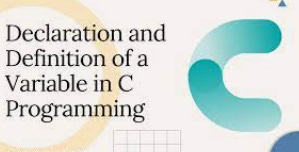Mastering Variables in C Programming - A Comprehensive Tutorial
Welcome to another exciting tutorial on Flexteck's channel! In this session, we'll delve into the core of C programming - Variables. Understanding variables is fundamental to mastering any programming language, and C is no exception. Let's explore the world of variables together!
What is a Variable in C Programming?
A variable is a name given to a memory location that can store a value of a specific data type. In C programming, variables are used to store data that can be manipulated by the program. Each variable has a specific data type, indicating the kind of values it can store. For example, you can use a variable to store a number, a character, a string, or a pointer.
Types of Variables:
Integer Variables (
int):Used for storing whole numbers.
Examples: 42, -15, 0.
Floating-Point Variables (
float,double):Used for storing real numbers (numbers with a decimal point).
Examples: 3.14, -0.005, 8.0.
Character Variables (
char):Used for storing individual characters.
Examples: 'A', '5', '$'.
String Variables (
char[]orchar*):Used for storing sequences of characters.
Example: "Hello, World!".
Boolean Variables (
bool):Used for storing true/false values.
Examples:
true,false.
Variable can either be local or global. local and global. Local variables are declared and used within a function or a block of code. They are created when the function or the block is entered and destroyed when it is exited. Global variables are declared outside any function or block of code. They are accessible from any part of the program and exist until the program ends.
Declaration and Initialization:
To use a variable in C programming, you need to declare it first. Declaration tells the compiler the name and the type of the variable. For example:
int x; // declares an integer variable named x
char c; // declares a character variable named c
Variable Naming Conventions:
There are some rules and conventions for naming variables in C programming. Some of them are:
Variable names can consist of letters, digits, and underscores (_).
Variable names cannot start with a digit.
Variable names are case-sensitive, meaning x and X are different variables.
Variable names should be meaningful and descriptive, but not too long.
Variable names should not be keywords or reserved words in C, such as int, char, if, for, etc.
Using Variables in C:
To use a variable in C programming, you need to refer to its name. You can perform various operations on variables, such as assignment, arithmetic, comparison, etc. For example:
x = 20; // assigns the value 20 to the variable x
y = x + 5; // assigns the value of x plus 5 to the variable y
z = x * y; // assigns the value of x multiplied by y to the variable z
if (x > y) // compares the values of x and y
{
printf("x is greater than y\n"); // prints a message if x is greater than y
}
Best Practices:
To write clear and maintainable code using variables in C programming, you should follow some best practices, such as:
Choose Descriptive Names:
Select names that reflect the variable's purpose.
Initialize Before Use:
Always initialize variables before using them to avoid unpredictable behavior.
Stay Consistent with Data Types:
Use the appropriate data type for your variable to ensure efficient memory usage.
Now that you've grasped the basics of variables in C, it's time to apply this knowledge in your coding journey! Variables are the building blocks of every program, and mastering them opens the door to endless possibilities.
Happy coding!
Stay tuned for more insights and coding adventures!
Subscribe to Flexteck on Substack | Flexteck's YouTube Channel
Hashtags:
#CProgramming #VariablesInC #CodingTutorial #LearnToCode #ProgrammingBasics #FlexteckTutorials #CodeNewbie #ProgrammingFundamentals



